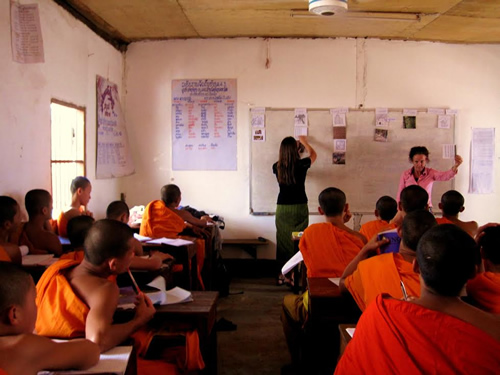Why Volunteer Overseas?
The Top 10 Reasons to Volunteer
Transitions Abroad editor Gregory Hubbs
interviews Zahara Heckscher, co-author of a classic book: "How
to Live Your Dream of Volunteering Overseas."
Zahara co-authored a follow-up classic titled "Learning
Service: The Essential Guide for Anyone Considering Volunteer
Travel."
 |
| Volunteer with Buddhist novice monks in Laos. Photo courtesy of GVI. |
Transitions Abroad: Based on your experiences as a volunteer, and your research on international volunteerism, what do you think are the most important reasons to volunteer in another country?
Zahara Heckscher: Here are my top 10, in order of importance:
- To learn.
- To share a specialized skill.
- To provide economic support for worthy projects.
- To improve cultural awareness.
- To enrich retirement.
- To learn a new language.
- To reassess priorities.
- To demonstrate practical acts of solidarity.
- To explore a new career
- To help.
TA: That's interesting — why do you say "to learn" first and "to help" last?
ZH: I think learning is the best reason for volunteering because it reflects an honest and humble set of expectations. Volunteers often don't have the language skills, technical skills, time, cultural knowledge, or other resources needed to create lasting change in the community. But the learning that can occur during a volunteer experience can indeed be part of long-term transformation. It starts with transforming the volunteer himself or herself. Volunteers learn how different another culture can be, and the vital essence of humanity that exists in every culture. They learn intercultural skills that can be used back home. They learn practical skills — how to teach, how to write a proposal, or how to plant a tree. Many volunteers report having experiences that advance their spiritual or moral understanding. I believe that all these learning experiences helped to make volunteers the kind of people that can create long-term change — whether through returning overseas in a professional capacity, bringing ideas from overseas back to help develop their own communities, or getting involved in different kinds of social change at a deeper level.
As I have explained in another article, "The Seven Sins of Overly Altruistic Volunteers," I think that volunteers who put the helping goals first, ironically, end up creating problems for local communities because they lack a mature attitude towards volunteering.
TA: Your third top reason for volunteering, providing "economic support for worthy projects" is unusual — we normally think of volunteering as "free labor" and not in terms of financial contributions to local communities.
ZH: Indeed, volunteering is by definition the donation of free labor. However almost all volunteer programs also have an effect on the local economy, and in many (but not all) cases this effect is positive. Some programs make this financial support an explicit part of the organization. For example, when volunteering with Habitat for Humanity, some of your program fee supports the excellent work the organization does to provide low-cost housing, even in communities that don't host volunteers. Earthwatch Institute has a similar program where the volunteer fees support vital scientific research. Other programs provide support to local institutions such as schools or community-based nonprofit organizations.
Even where the volunteer organization does not explicitly make a donation to a local group, volunteers themselves often provide economic development merely by paying to stay in the local community and eat local meals. For this reason, volunteers, like other travelers, should think carefully about how they spend their money overseas, for example, by favoring local farmers in the market over multinational grocery stores.
TA: Why do you highlight volunteering as a way to enrich retirement?
ZH: While the majority of volunteers are young people, a significant minority are 50 and older. We found that organizations overseas especially appreciate these older volunteers. For example, older doctors may be better able to function without the latest electronic health technology. A retired teacher has skills to offer based on decades of experience, rather than just good intentions or knowledge of a recent trend in education. Experienced volunteers tend to be more patient, more realistic about what they can accomplish, and less fazed by the disappointments that inevitably occur, compared to younger people just starting out.
TA: Could you provide some examples of how volunteering can help someone explore a new career?
ZH: Many volunteers appreciate
the opportunity to use existing skills — such as accounting,
writing, or nursing. But others want to do something totally
different, often in pursuit of new directions in their lives. I
think international volunteerism is a wonderful way to do this. Much
better than investing a couple years in graduate school and then
discovering that you're not really interested in the field after
all. For example, a person considering a career in education
might work with Global
Volunteers on a short-term teaching program or DiscoverCorps on
a longer term program. Someone interested in agriculture
might get their feet wet through WWOOFING.
 |
|
Teaching children in Thailand. Photo courtesy of Worldteach. |
TA: Some people think that the whole idea of international volunteerism is flawed. My parents were actually told in Ethiopia when they went in 2001 that what was needed was money, not volunteers. They were told that volunteers from within that country were more valuable and money was what was needed, as local volunteers provide long-term stability and continuity for orphans and other needed infrastructure projects.
ZH: I completely understand this perspective, and I have heard comments similar to what your parents heard in Ethiopia. In his speech, "To Hell with Good Intentions," Ivan Illych told a group of volunteers "I am here to entreat you to use your money, your status and your education to travel in Latin America. Come to look, come to climb our mountains, to enjoy our flowers. Come to study. But do not come to help." I do think that anyone considering international volunteers and should read Ivan Illych's full speech. It is from 1968, but still fresh and astringent today. And I agree with the essence of his points — in some cases, volunteers can be a burden on local organizations. They sometimes set bad examples for local youth, and disempower people trying to create development from within communities. Overly altruistic volunteers create problems. So yes, volunteering can be problematic, and good intentions do not necessarily lead to good outcomes if a volunteer program is ill-conceived.
However, my perspective is that rather than suggesting that people should not volunteer at all, it is better to help people volunteer responsibly. This perspective is parallel to my views on responsible travel. We all know that some people travel as "ugly Americans," seeking the comforts of US suburbia no matter where they are, disrespecting local culture, treating local people with rudeness and disdain. But we also know that thanks to responsible travel advocates like your dad [the late Clay Hubbs, founder of Transitions Abroad], socially and environmentally responsible tourism has come to be a way to promote meaningful intercultural interaction and economic development that empowers local communities.
I believe that the same is true for international volunteerism. I have definitely seen development workers that act like “ugly Americans.” I had the misfortune of volunteering with a program that I would characterize as "irresponsible" volunteerism (IICD). But volunteers who do due diligence and research volunteer programs before they go can find programs that follow the principles of socially responsible travel. In fact, I think the majority of volunteers sending organizations follow these practices. I would certainly highlight the work of the International Volunteer Placement Association in creating and upholding standards for the field, and I think IVPA member organizations have internalized the critiques of people like your dad and created programs that truly create a positive role internationally.
TA: Are there any reasons you would consider "bad reasons" to volunteer?
In our book, Joe Collins, Stefano DeZerega, and I listed our top 10 bad reasons to volunteer abroad:
- To escape a bad relationship or other personal problems.
- To save poor people or to lift poor people out of poverty.
- To assuage your guilt.
- To travel or have an adventure purely for personal enrichment.
- You are unable to hold a job.
- You are unable to pass your classes.
- Everyone's doing it or your partner is doing it.
- To make religious converts.
- To just impress future employers.
- You have an addiction and think a change in environment will help you.
I think that's a pretty good list and I stand by it.
TA: You just argued against "overly altruistic volunteers." So isn't there a contradiction in saying that "personal enrichment" is a bad reason for volunteering?
ZH: Altruistic and selfish motivations for volunteering are only negative if they are not in balance. I think the best volunteers combine a sense of responsibility for healing the world with a humble acknowledgment of the limits of their powers. They also put some thought into the ways they will benefit from volunteering. But volunteers who just want to have an adventure, or just want something impressive for their résumés, are just as out of balance as those who have unrealistically altruistic motives. Personal enrichment is a fine motivation for volunteering as long as it is in balance.
TA: What should prospective volunteers do if they recognize themselves more in the "bad reasons" than the "good reasons."
ZH: I suggest that prospective volunteers of that type do a few things. Those with emotional problems or addiction should deal with these issues first through therapy or support groups. I also suggest that all prospective international volunteers get some experience volunteering in their local community to develop their skills and get a better sense of what volunteering really means. People who are not sure about volunteering also consider alternatives to volunteering — international travel, ecotourism, and study tours, for example. As we say in our book, "volunteering is not the only way to go overseas nor is it the only way to do good in the world."
TA: Thank you, Zahara.
ZH: Thank you, Greg. It is a privilege to be involved with Transitions Abroad.
ZAHARA HECKSCHER is the co-author of the book How to Live Your Dream of Volunteering Overseas, which includes evaluations of over 80 volunteer programs and suggestions for preparing to volunteer. Zahara co-authored a follow-up book which is an instant immediate classic titled "Learning Service: The Essential Guide for Volunteering Abroad."
|
